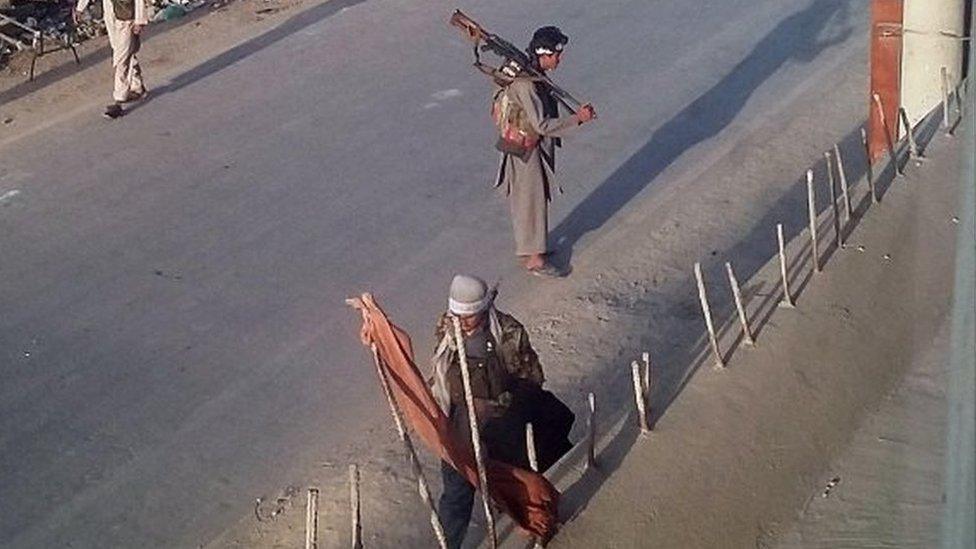Is Russia arming the Afghan Taliban?
- Published
Gen John Nicholson: "We know that the Russians are involved"
The US accuses Russia of trying to destabilise Afghanistan by supporting the Taliban. Senior US officials have been saying for months that Moscow is even supplying the militants with weapons.
Russia and the Taliban, who are historic foes, deny the charges. They come amid what some observers see as a "new Cold War" - so how much truth is there to the US claims?
What is the US alleging?
In a BBC interview in late March, the commander of US forces in Afghanistan Gen John Nicholson alleged that Russian weapons were being smuggled across the Tajik border to the Taliban.
He accused Russia of exaggerating the number of Islamic State (IS) fighters in Afghanistan "to legitimise the actions of the Taliban and provide some degree of support to the Taliban".
"We've had weapons brought to this headquarters and given to us by Afghan leaders and [they] said, this was given by the Russians to the Taliban," he said.
Some Afghan police and military officials told the BBC that the Russian military equipment includes night-vision goggles, medium and heavy machine guns, and small arms.
Who agrees?
US officials have accused Moscow of supporting the Taliban for more than a year. In December 2016 Gen Nicholson criticised Russia and Iran for establishing links with the Taliban and "legitimising" the group.
Since then a number of high-ranking US officials, mainly military, have made similar claims, some suggesting Russia is also arming the Taliban.
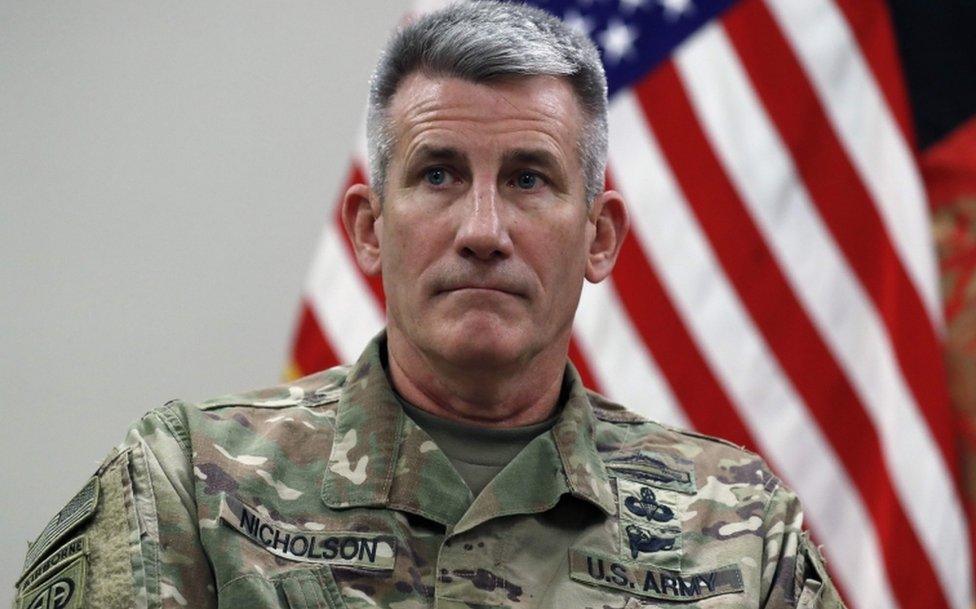
General John Nicholson has accused Russia and Iran of "legitimising" the Taliban
But a number of US and Nato officials have been more cautious.
Testifying at a Senate hearing in May 2017, US Defense Intelligence Agency Director Lt-Gen Vincent R Stewart said: "I have not seen real physical evidence of weapons or money being transferred."
US Defense Secretary James Mattis told the House Armed Services Committee in October 2017 that he wanted to see more evidence about the level of Russian support for the Taliban, adding that what he had seen "doesn't make sense".
Nato Secretary General Jens Stoltenberg is on record saying, in July 2017, "we haven't seen any proofs, any confirmed information about that kind of support".
For its part Tajikistan has denied funnelling Russian weapons to the Taliban, calling Gen Nicholson's claim "groundless".
What's the view of Afghan officials?
The Afghan authorities have also given contradictory statements.
A few provincial officials have been explicit in alleging Moscow's military support for the Taliban. But the spokesman for Afghanistan's chief executive officer (CEO) said in May 2017 that there was no evidence.
Last October President Ashraf Ghani publicly taunted the Taliban for accepting Russian guns.
However, his defence minister said the following month that such reports were just "rumours" and "we don't have evidence".
What do Russia and the Taliban say?
Moscow and the Taliban deny the US claims that they are working together. They separately rejected Gen Nicholson's comments to the BBC, saying he had no evidence.
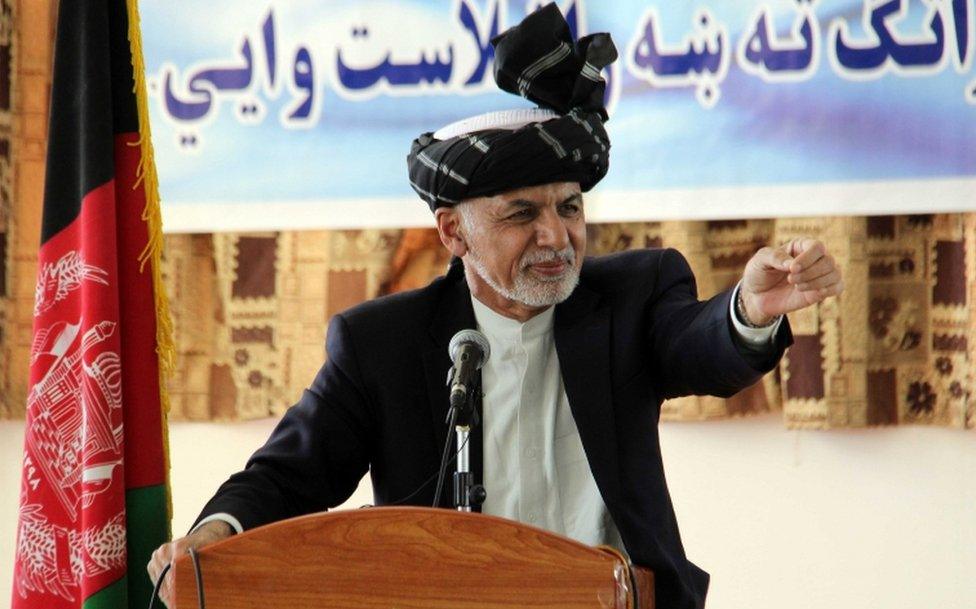
Afghan President Ashraf Ghani has claimed that Russia is arming the Taliban
The Russian embassy in Kabul and the foreign ministry in Moscow dismissed such claims as "baseless" and "idle gossip".
A Taliban spokesman said they had not "received military assistance from any country".
Moscow has repeatedly accused the US and Nato of trying to blame Russia for their "failures" and worsening security in Afghanistan.
Russian officials and politicians have even implied that the US and Nato support IS in Afghanistan; a charge the US vehemently denies and most observers find incredible.
Do Russia and the Taliban acknowledge links?
Russia denies materially supporting the insurgents but acknowledges "contacts" with the Taliban.
According to some Taliban sources, a communication channel between Moscow and the Taliban was established almost a decade ago, following the Taliban's removal from power by the US in 2001.
But ties between Moscow and the Taliban have improved significantly over the past three years, especially since the establishment of the so-called "IS Khorasan" group in Afghanistan in January 2015.
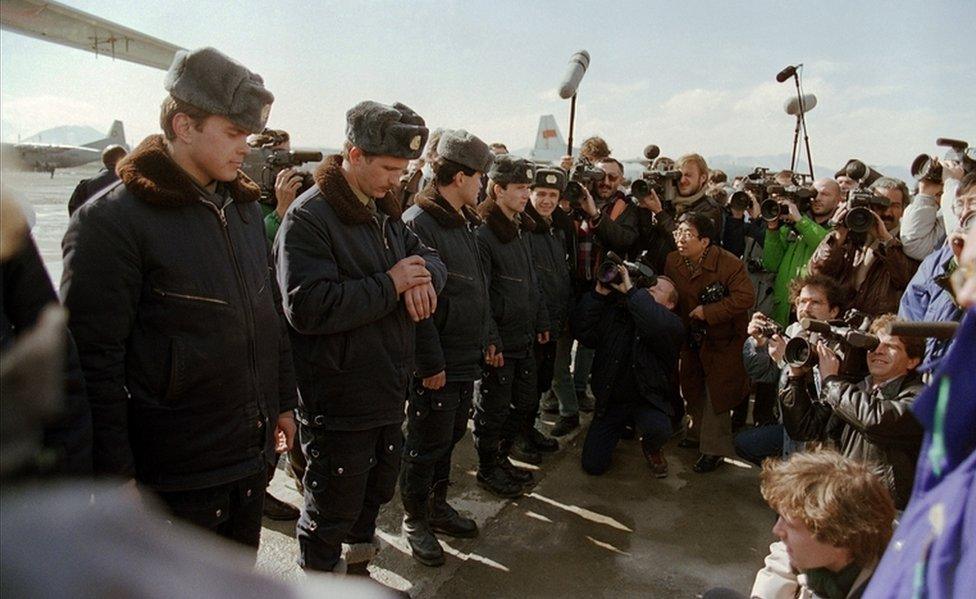
Red Army soldiers in February 1989 during the Soviet Army's withdrawal from Aghan War
Taliban sources confirm their representatives have met Russian officials inside Russia and "other" countries several times.
As part of these new "links", some Taliban expected sophisticated weapons from Russia that could dramatically turn the Afghan war in their favour - anti-aircraft guns and missiles that could challenge US air supremacy; similar to the surface-to-air Stinger missile the US provided to the Afghan resistance fighters during the Soviet-Afghan war in the 1980s.
So far this remains wishful thinking on the part of the Taliban mainly for two reasons - such weapons could be easily traced back to the source and US-Russia relations are not that bad to justify such a drastic measure.
What do the Taliban gain from Russia?
For the Taliban, moral and political support by a major regional power is more important than the light weapons they say are widely available in Afghanistan and can be bought on the black market in the wider region.
Taliban diplomatic outreach also extends to building relations with China and Iran.
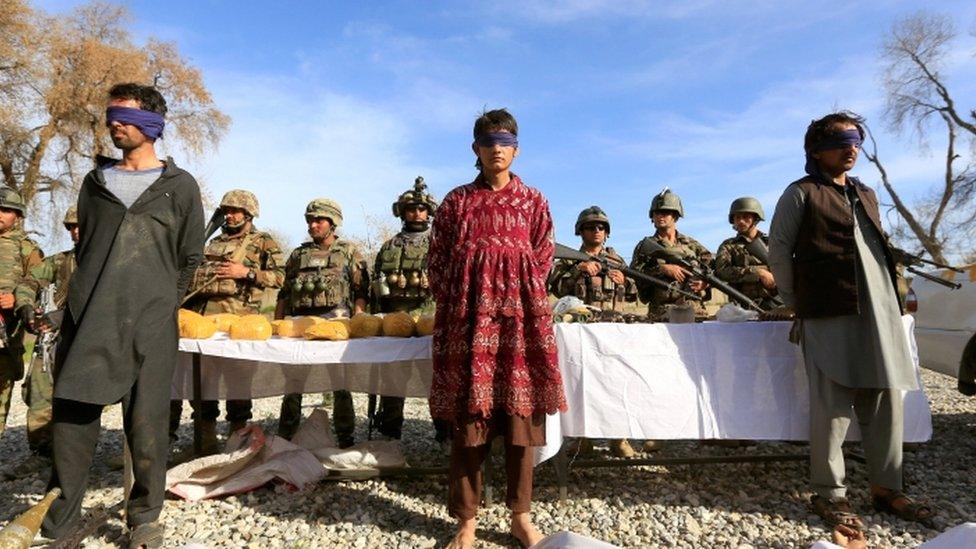
Suspected Taliban militants held by Afghan security forces in Jalalabad
This is a morale-booster and has strengthened Taliban conviction in the "legitimacy" of their struggle to oust US-led forces from Afghanistan.
The fact that Russia and Iran are accused of supporting the Taliban challenges the narrative that the militants are solely dependent on Pakistan.
From enemies to frenemies?
Softening its approach towards the Afghan Taliban is a dramatic and somehow unexpected shift for Russia.
Almost all founding members of the Taliban movement were part of the mujahideen, which fought against the Soviet occupation of Afghanistan in the 1980s. During the factional war that followed the Soviet pullout, Russia provided financial and military support to groups opposed to the Taliban.
But after the US invasion of Afghanistan following the 9/11 attacks in the US, the Taliban apparently saw an opportunity to work with Russia.
Russia now no longer sees the Taliban as a pressing security threat. Instead, policymakers in Moscow view the group as a reality in Afghanistan which cannot be ignored.
In March 2017, President Putin's special envoy for Afghanistan, Zamir Kabulov, even said the Taliban's demand for the withdrawal of foreign troops from Afghanistan was "justified" and criticised the long-term presence of US and Nato forces in the country.
What does Russia gain?
There are three major reasons for Russia-Taliban links.
Firstly, Russian officials say these contacts are aimed at ensuring the security of Russian citizens and political offices in Afghanistan, especially in areas where the resurgent Taliban have expanded their territorial control in recent years.
At least two Russians were captured by the Afghan Taliban on two separate occasions, in 2013 and 2016, when their helicopters crashed in Taliban-controlled areas. Both were released after lengthy negotiations.
Secondly, the emergence of IS in Afghanistan prompted fears in Moscow that the group may expand into Central Asia and Russia.
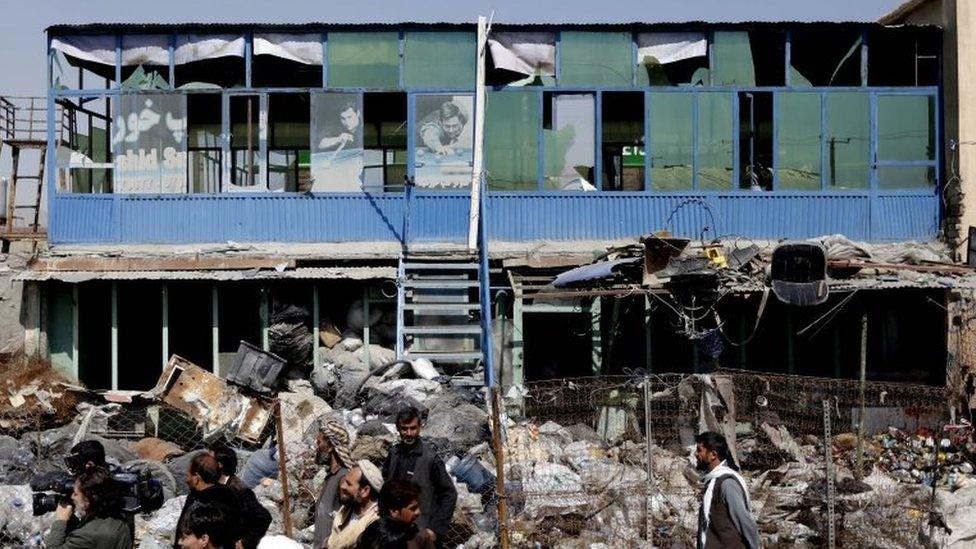
The Taliban continues to use suicide bombing attacks including this, targeting global security firm G4S in Kabul
The Afghan Taliban have been fighting against IS in Afghanistan and repeatedly assured neighbouring countries, that unlike IS, their armed struggle is limited to Afghanistan. In December 2015, the Russian president's special representative to Afghanistan, Zamir Kabulov, declared that "the Taliban interest objectively coincides with ours" in the fight against IS.
Russia has also suggested the possibility of staging a Syrian-style intervention in Afghanistan if IS gained strength and became a "serious threat" to the stability of Central Asian countries on the pretext of protecting its "backyard".
However, US officials say Moscow uses the IS presence as an excuse to justify its meddling in Afghanistan and to further grow its military influence in Central Asia.
Thirdly, Russian officials insist the Afghan conflict needs a political, not a military, solution. They have grown increasingly frustrated by and suspicious of the US strategy that has not so far stabilised Afghanistan after 16 years of fighting.
Moscow says the contacts are intended to encourage the Taliban to enter peace talks.
What's the effect on the Afghan conflict?
A resurgent Russia under President Putin has been pushing for influence in Afghanistan, in moves seen as part of an effort to ensure a seat for Moscow at the top table in any future arrangement in the country.
This comes at a time when US-Russian relations are at a low point and the geopolitical situation is changing fast.
Moscow's increasingly assertive stance is linked to US-Russian tensions in other parts of the world, especially Ukraine and Syria.
By establishing links with the Taliban, Moscow seems to be aiming to pressurise and even undermine the US and Nato.
Meanwhile, as the rift between Washington and Islamabad grows, Russia and Pakistan are building diplomatic and military relations after decades of hostility.
Moscow's reappearance in Afghan affairs is largely designed to irritate the Americans.
The persistent accusations traded by the former Cold War powers has to be seen in the context of a wider blame game. Their rivalry is complicating the conflict in Afghanistan, where the number of actors is increasing.
This has renewed fears of a "new Great Game", with Afghanistan once more a battlefield for regional and international players. A way out of the decades-long quagmire appears as far off as ever.
- Published25 March 2018
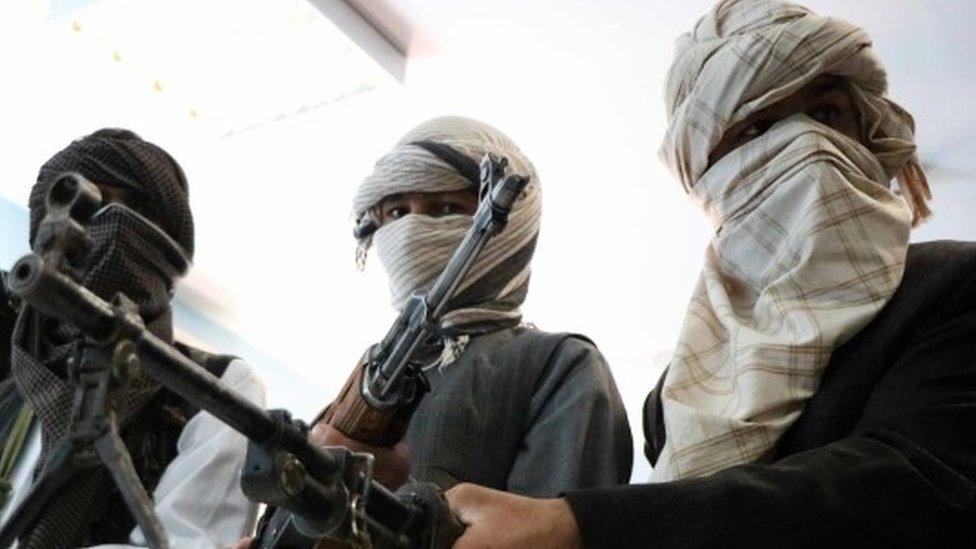
- Published23 March 2018
- Published12 January 2017
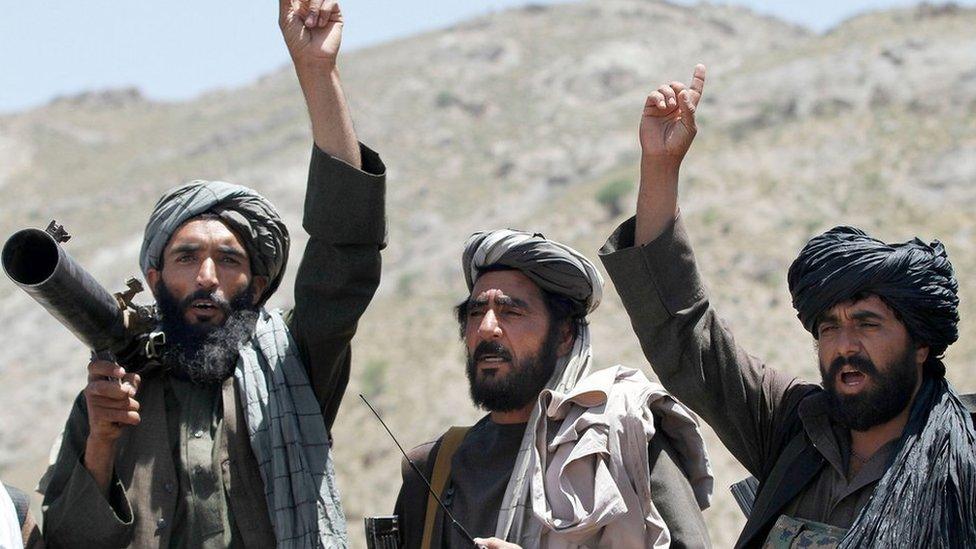
- Published25 February 2017
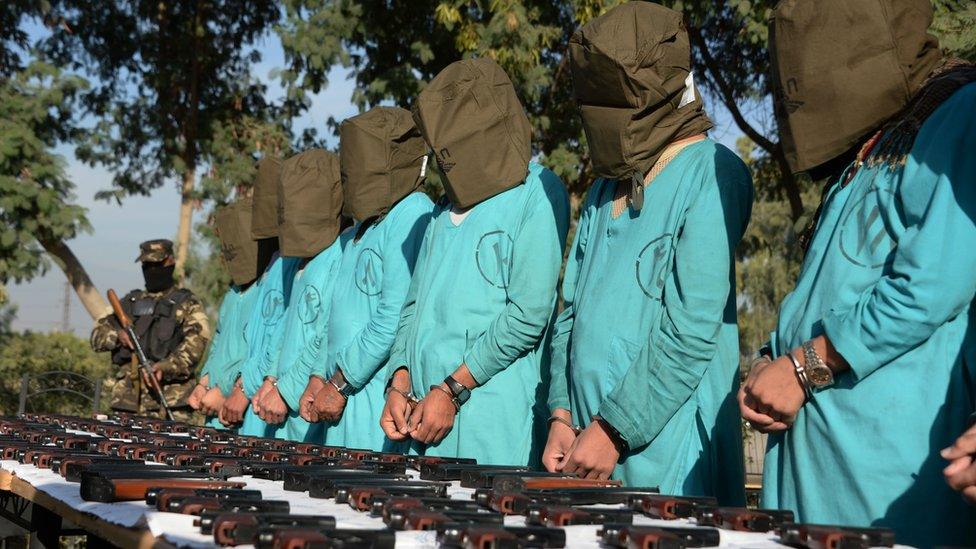
- Published5 January 2016
